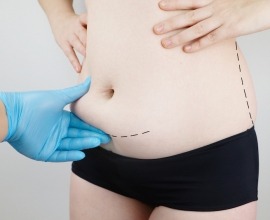What is a tummy tuck?
A tummy tuck - or abdominoplasty - is a common plastic surgery technique used to help flatten the abdomen by removing excess fat and skin, and tightening the muscle tissue around the stomach.
Contrary to popular belief, tummy tucks aren’t designed as a weight loss technique for obsese people, instead the ideal candidate for abdominoplasty surgery are non-smokers, at a stable weight and in good physical shape.
Tummy tucks offer an affordable and relatively non-invasive solution for people who have lost elasticity in their skin and for women whose muscles and skin may have been stretched due to pregnancy.[1]
Improved muscle tone, smoother skin, a flatter stomach and improved body confidence are some of the many benefits associated with tummy tucks.
In the UK, the cost of a tummy tuck operation typically costs between £4,500 and £6,000 in addition to any follow up consultation costs, however in parts of Europe the procedure can be significantly cheaper.[2]
How does a tummy tuck operation work?
The first stage of a tummy tuck operation involves making a cut along your pubic area from hip-to-hip. Your surgeon will then make another incision around your belly button to loosen it from the surrounding skin.
After removing any excess fat and skin and tightening your abdominal muscles, the remaining skin is then pulled down and realigned creating a more taught and flatter stomach. The full procedure typically takes an average of three hours.
A mini tummy tuck, meanwhile, is designed for patients who have smaller amounts of abdominal fat and relatively minor muscle flaccidity. In these cases, a surgeon will withdraw excess fat using liposuction and remove any redundant skin.[3] If you have issues with your muscle flaccidity, the medial part of the abdominal skin will be removed during this procedure.
Liposuction vs tummy tuck
Liposuction - or lipoplasty - is a non-invasive cosmetic procedure aimed at people who already have relatively good quality skin and muscle tone. Designed to improve the shape and contours of a patient’s stomach, liposuction is ideal for individuals who do not have loose abdominal muscles. Unlike a tummy tuck, however, liposuction will not remove stretch marks and any excess skin.[4]
If you have moderate to large amounts of excess skin or loose abdominal muscles from excessive weight loss or pregnancy, a tummy tuck remains your best option for improving muscle tone and the flatness of your stomach.
Does a tummy tuck procedure cause scarring?
There are a number of personal factors that can have an impact on the severity of scarring you’re likely to receive during a tummy tuck procedure, including your age, genetics, whether or not you’re a smoker, any infections you may have, the level of tension surrounding the wound, and your general health.
Depending on the techniques used by your surgeon, the type of incisions they make, and your body’s natural healing abilities, tummy tuck scars can appear in areas including the pelvic region, in the lower abdominal area, and around the belly button.[5]
Some common short-term side effects of tummy tuck surgery may include:
-
Pain and bruising in the abdomen
-
Numbness in the stomach area
-
Difficulty standing up straight
-
A build of fluid in the abdomen
-
Raised, red scars that eventually fade
How long does it take to recover from a tummy tuck operation?
Recovery from a tummy tuck procedure generally takes around six weeks. During this period you should avoid any strenuous activity including heavy lifting and physical sports. As long as you follow your doctor’s advice, in most cases you should be able to return to work after two weeks.
According to Bupa, too much physical activity can increase swelling around your wounds and cause scars to stretch, as well as slowing down the healing process.[6]
If you find you’re in pain during the healing process, you can take over-the-counter painkillers including ibuprofen and paracetamol. Again, make sure you speak to your doctor before taking any medication.
SOURCES:
[1] https://www.bupa.co.uk/health-information/cosmetic-surgery-and-procedures/tummy-tuck
[2] https://www.verywellhealth.com/tummy-tuck-surgery-what-you-need-to-know-2709990
[3] https://www.nhs.uk/conditions/cosmetic-procedures/tummy-tuck/
[4] https://www.isaps.org/procedures/body/mini-abdominoplasty/
[5] https://www.westlakedermatology.com/blog/tummy-tuck-vs-liposuction/
[6] https://www.zwivel.com/blog/tummy-tuck-scars/















